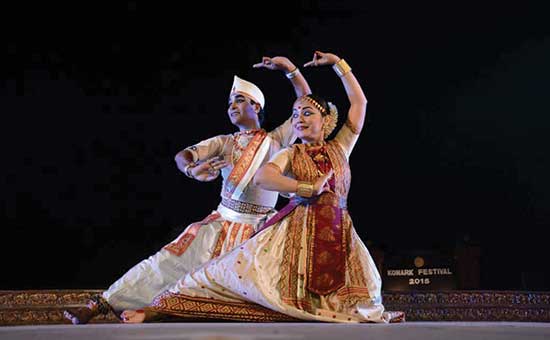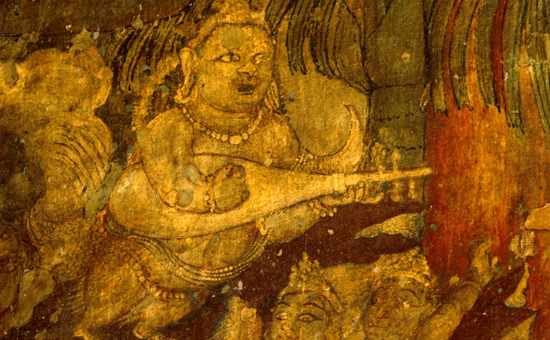- Were
our Vedic Sages insular, being preoccupied with their meditations? The writer
explains with copious illustrations that they were far from being other-worldly,
covers music-dance-painting. Indeed, they showed that life had to be lived in
all its warmth and splendour. They were the greatest artists of life, literally
as well as figuratively.
It
is a common observation of the occidental scholars that there is little of
aesthetic value in the Rig Veda. Whatever the motive, this view seems to be
untrue. In Rig Veda we come across mention of the various Fine Arts, beside a
theory of Fine Art.
To
begin with, we read of a series of musical instruments. Chief among these are vana, vani, bakura, bhritni, vansa, kshoni,
nali, karkuri, aghati and so on! There is the dhamani along with a predicate derived from this word, dham,
constantly employed with these instruments (2.11.8). Most of them are applied
to the Maruts, who are said to be the best songsters. There are orchestral
bands of musicians made up of these Maruts too. Maruts formed themselves into various
groups or ganas presided over by Brihaspati, the Ganpati.
It
is by having song as the accompaniment that Brihaspati cleft the rock or cave
and killed Vala, only to let loose the waters and light. The significance of
this activity is that, music opens the doors to light and freedom. Music is one
of the Fine Arts and like all other arts, it is the revelation of the Spirit in
a sensuous garb.
This
is the meaning of the exploits of Brihaspati, who is also the lord of prayer.
The same music is also cultivated by human beings. They sing their songs in a
sweet voice. The melody of Samagana
is proverbial.
If music was not an integral part of Rig Veda, then there is no meaning in the compilation of Sama Veda
which is nothing but Rig Veda set to music!
Further,
the refrains of Rig Veda are mostly lyrical. They were mainly meant to be sung.
For instance, in the dialogue-hymn of Vrisakapi there is a refrain, “Visvasmad indra
uttarah” (10.86). Now Indra too is one of the characters in this dialogue. Then how can he too glorify himself? It is evident that something like the chorus or the orchestra is necessary to sing it. Moreover, coming in a
dialogue, it demands music together with dance.
Article is courtesy Bhavan’s Journal.
 Khajuraho Dance Festival by Suchit Nanda.
Khajuraho Dance Festival by Suchit Nanda.
In
the field of dancing we have better information. Dancing was popularised by the courtesans who were till recent times the best dancers in India. Ushas was the prototype of these dancers. Dance brings forth rhythm. We are informed that the universe sprang out of dance, the dance of the gods: “When the gods lived in the pool, when the world was yet water, then a pungent particle went forth as if they were dancing”. (X. 72. 6).
The
Soma dances so that Indra might come pleased by the offerings (X. 94. 4). The
Soma-pressing stones too dance like the black deer in the stall. (X. 94. 5).
Men
danced holding their bamboo sticks aloft in the air (I. 10. 1). Even the battle
provoked Indra to dance because of excitement and the consequent emotion (I.
120. 7). That is, emotion is the root cause of dance. Decent women appeared on
public occasions in white garments and coverings only to dance (8.17.7). A
funeral too was celebrated with dance (10. 18. 3).
That is, dance enlivens the spirit of man and consoles him.
This
is the purgation of the Aristotelean theory of art. Ushas appears like a
dancer; she decorates herself like a dancer and lays bare her breast as the cow
does its udder to the calf. This reveals the existence of professional dancers
in Vedic times.
There were assemblies or gatherings that promoted these arts. These were termed ‘Samana’. In a celebrated hymn to Ushas we read (10.12.4):
“She decks her beauty shining forth with sunbeams
Like women trooping to the festive gathering.”
The
people incline to Agni as the women at a gathering fair. (4.58.8). This custom of going to the assembly or
gathering is very old (10.86.10). We are told that the two ends of the bow meet
like a woman and her lover in the gathering place. (6.75.4).
The
waters hurry to the wind as dames to an assembly (10.118.2). These gatherings
were visited by all kinds of people. Bowmen went there to exhibit their skill
in archery (6.75.3, 5). Horses were taken for races (9.96.9). Women flocked
there to enjoy themselves and seek lovers (1.124.8; 4.58.8; 7.2.5). Old ladies,
aged spinsters (7.2.5.) and courtesans (4.58.8) were a party in these festive
gatherings.
Pischel
argues that the dancers of the vedic times were courtesans. He compares yoshah kalyanyah smayamanasah of Rig
veda (4.58.8) with kanyah, kalyanyak
of Mahabharata. He also brings in other passages to prove his contention. They
are:
“Yabhih somo modate harsate ca kalyanibhih yuvatibhir
na maryah.” (10.35.5)
“Samanam na yosanah.” (10.168.2)
“Samaneva yosa” (6.75.4).
It
is these dancers and the courtesans that took to dance and became in due course
professional dancers. The Vedic society was full of this dancing art.
From
the foregoing it is evident that the Vedic poet considered that dance has its
origins in emotion or excitement. It must be harmonious and rhythmic. It is a
great enlivening force of life. It consoles us, ennobles and purifies us. It is
to be accompanied by music. Ornamentation and decoration too figure therein.
The immediate effect of this art is delight.
 Kinara in Cave 1
of Ajanta. By Benoy K Behl.
Kinara in Cave 1
of Ajanta. By Benoy K Behl.
Painting was recognised early as a Fine Art. The great painters
of the vedic poets were Dyavaprithivi.
They
paint the universe with colours (9.5.6; 10.70.6). Tvastar was the great architect of the gods who fashioned the
thunderbolt for Indra and carved out a cup for the gods to drink Soma. This cup
was divided into four by the equally great artist Ribhus. Amongst the best painters was Varuna who paints the sky with stars. The Asvins too had something to do with painting.
On
the whole, we have ample references to dancing and poetry alone. But it does
not mean that the Vedic poet did not know of the other arts. We have only a
fragment of Rig veda.
As
regards poetry they present a very modern theory. They considered the form and
matter of the poem as inseparably united. The work of art is a creation. It is
a revelation. It is the inspiring force that sings for the poets. It has been
said:
“Indro brahmendra rishih.”
Inspiration
was an essential feature of their poetic faith. The poem must be a new one. It
must be simple, sweet and transporting, for a Yaska said, the vedic seers were “Sakshat Krita dharmana rishayah”. It is as poets that they had the mystic insight into the reality of the unseen.
“Kavih Kavyenasi visvavit”;
“Kavih kavitva divi rupam asajat.
To
read the article in PDF click on PDF.
This article was first published in the Bhavan’s Journal, 15 August 2020 issue. This article is courtesy and copyright Bhavan’s Journal, Bharatiya Vidya Bhavan, Mumbai-400007. eSamskriti has obtained permission from Bhavan’s Journal to share.